| | Electrical/starting issues |  |
|
+7john grinsel steve_h80 Mike from NS DennisB cliffyk oldwingguy CathyN 11 posters |
| Author | Message |
|---|
CathyN
Silver Wing Expert

Number of posts : 771
Location : USA
Points : 6039
Registration date : 2010-11-15
 |  Subject: Electrical/starting issues Subject: Electrical/starting issues  Fri Jul 15, 2016 9:48 pm Fri Jul 15, 2016 9:48 pm | |
| Has anyone experienced the following?
Bike has been starting normally. Drove 20 miles stopped for gas. Put ignition switch in on position. Had it on a about a minute. Then tried to start the bike and all the dash lights and after market voltage meter began to flash. Turned off ignition.
Tried again nothing but flasihing. Turned off all my accessories. The engine turned over slowly. Then with increased engine rpm the voltage meter showed that the battery was being charged. Road the bike ten miles without issue. Started bike three hours later without issue. Battery is a lithium ion Shorai 4 yrs old. I have been on a two week trip and have put on over 2500 miles so far. Have about 550 miles left to get home.
Wondering why the dash would flash like that? Could it be more than just a new battery issue? |
|
  | |
oldwingguy
Silver Wing Guru

Number of posts : 1935
Location : Hocking Hills U.S.A.
Points : 5354
Registration date : 2016-01-29
 |  Subject: Re: Electrical/starting issues Subject: Re: Electrical/starting issues  Sat Jul 16, 2016 7:04 am Sat Jul 16, 2016 7:04 am | |
| SWAG here, check your battery cables, tighten them. |
|
  | |
cliffyk
Maxi-Scooter Rider

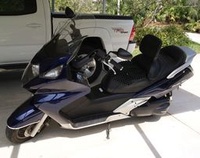
Number of posts : 182
Age : 78
Location : Saint Augustine FL
Points : 3309
Registration date : 2016-05-15
 |  Subject: Re: Electrical/starting issues Subject: Re: Electrical/starting issues  Sat Jul 16, 2016 10:42 pm Sat Jul 16, 2016 10:42 pm | |
| Did the voltage meter indicate what the voltage was? A serviceable battery should supply at least 12.4 to to 12.6 V after having the ignition on for a minute, and 10.5 V or more while cranking. The dash indicators flashing points to the voltage falling below 10.0 to 10.5 V.
Four years is approaching "pretty old" for a seasonally used bike battery... |
|
  | |
DennisB
Silver Wing Guru

Number of posts : 2778
Age : 74
Location : NE Oklahoma
Points : 9093
Registration date : 2008-12-28
 |  Subject: Re: Electrical/starting issues Subject: Re: Electrical/starting issues  Sun Jul 17, 2016 8:08 am Sun Jul 17, 2016 8:08 am | |
| Hi Cathy,
Sounds like you need a new battery. I just wish they would last forever. Four years is a very good stretch for a scooter battery. |
|
  | |
Mike from NS
Silver Wing Rider


Number of posts : 461
Age : 71
Location : Nova Scotia
Points : 4589
Registration date : 2013-09-12
 |  Subject: Re: Electrical/starting issues Subject: Re: Electrical/starting issues  Sun Jul 17, 2016 9:41 am Sun Jul 17, 2016 9:41 am | |
| Hope the trip continues with no more electrical issues. Stuff like that shakes the confidence level in the bike. On the battery replacement aspect. Last year I had lots of starting issues and slow idle to stall. At other times the bike started like a new bike would with a new battery. I often charged the battery until it seemed the charging no longer helped. Many suggestions pointed to a lightly used bike being my problem or the need to adjust idle screws. In the end I replaced the battery and have no problems since. However the failing battery was possibly the original battery that came with the bike. That would have made it 10 years old !!! No shame for it from what I've been reading. My suggestion is replacing the battery and then enjoy the rest of your trip.
Mike |
|
  | |
steve_h80
Silver Wing Guru

Number of posts : 1036
Location : Teesdale, UK
Points : 4225
Registration date : 2016-05-15
 |  Subject: Re: Electrical/starting issues Subject: Re: Electrical/starting issues  Sun Jul 17, 2016 12:30 pm Sun Jul 17, 2016 12:30 pm | |
| what accessories are you running? It's p ossible that they all combined to just drop the battery to a just too low level to turn it over. Although I can't imagine what could do that in a minute unless you had a lot of high drain stuff on like grips, heated seat, jacket, boots, trousers, tyre warmers and accessory flood lights... only joking about the tyre warmers before anyone asks :-) |
|
  | |
john grinsel
Curmudgeon

Number of posts : 3313
Age : 85
Points : 9460
Registration date : 2009-08-18
 |  Subject: Re: Electrical/starting issues Subject: Re: Electrical/starting issues  Sun Jul 17, 2016 12:37 pm Sun Jul 17, 2016 12:37 pm | |
|
Replace battery with new OEM
|
|
  | |
NWSSC
Silver Wing Rider

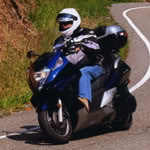
Number of posts : 418
Age : 87
Location : Mt Prospect IL 30 miles west of Chicago
Points : 5844
Registration date : 2010-03-03
 |  Subject: Electrical/starting issues Subject: Electrical/starting issues  Sun Jul 17, 2016 3:02 pm Sun Jul 17, 2016 3:02 pm | |
| Unanimously, replace the battery. Howard |
|
  | |
CathyN
Silver Wing Expert

Number of posts : 771
Location : USA
Points : 6039
Registration date : 2010-11-15
 |  Subject: Re: Electrical/starting issues Subject: Re: Electrical/starting issues  Sun Jul 17, 2016 11:04 pm Sun Jul 17, 2016 11:04 pm | |
| Battery was replaced. Just was not sure what all the blinking dash light were all about. We got back from a 3100 mile trip to New England/BMW Raly tonight. Replaced the battery with a Yuasa from Hamburg any were the rally was. Good thing we discovered it on yesterday. I will post pictures later. Trip was great.
Thanks for everyone's input.
Cathy |
|
  | |
exavid
Silver Wing Guru

Number of posts : 2658
Age : 81
Location : Medford, Oregon
Points : 8393
Registration date : 2009-07-17
 |  Subject: Re: Electrical/starting issues Subject: Re: Electrical/starting issues  Mon Jul 18, 2016 1:33 am Mon Jul 18, 2016 1:33 am | |
| Having the ignition on for a full minute is a pretty heavy draw with the headlights and other accessories that may be on. A new battery should be able to handle that but it's asking a lot from an older one. Even with a new one it's a lot better to leave the key off until ready to start. One reason is that the charging system doesn't put out much charging power below 3000rpm or so. Idle speed doesn't charge the battery, it's a steady discharge. So to tips, start the engine when you're ready to go. Don't idle the engine for lengthy periods, better shut if off and restart if it's going to be three or four minutes. |
|
  | |
cliffyk
Maxi-Scooter Rider


Number of posts : 182
Age : 78
Location : Saint Augustine FL
Points : 3309
Registration date : 2016-05-15
 |  Subject: Re: Electrical/starting issues Subject: Re: Electrical/starting issues  Mon Jul 18, 2016 1:49 am Mon Jul 18, 2016 1:49 am | |
| FWIW and in support of exavid's comments; the oscilloscope trace below shows the "start-up" current draw (in blue) for an '03 Suzuki Burgman 400. The major component of the 13.2 A stabilised draw is the headlamp:  The red trace is the battery voltage, it drops to 10.5 V at the initial surge but recovers to 11.9 V quickly. Though I have not performed this exercise on my "new-to-me" '06 Silver Wing I would not expect it to be radically different. The headlamp is on with the key on (off while cranking) with my '06; don't know if they are all like that. I'll run this on the S'wing when I get a chance... |
|
  | |
Cosmic_Jumper
Site Admin

Number of posts : 4415
Age : 81
Location : damn near Philadelphia, PA
Points : 10740
Registration date : 2009-06-12
 |  Subject: Re: Electrical/starting issues Subject: Re: Electrical/starting issues  Mon Jul 18, 2016 8:10 am Mon Jul 18, 2016 8:10 am | |
| Thanks for the chart Cliffyk. I almost understand what I'm looking at.
Q: So if the major current draw is the headlight then, as an emergency field expedient, given that weak battery scenario, would running with the headlight OFF (unplugged) get you another day's ride toward home? Would doing that fry the rectifier/regulator? IIRC The headlight and R/R act together to dissipate the excess current produced by the stator.
Tim |
|
  | |
cliffyk
Maxi-Scooter Rider


Number of posts : 182
Age : 78
Location : Saint Augustine FL
Points : 3309
Registration date : 2016-05-15
 |  Subject: Re: Electrical/starting issues Subject: Re: Electrical/starting issues  Mon Jul 18, 2016 10:38 am Mon Jul 18, 2016 10:38 am | |
| The best solution would be to not allow oneself to get into a "weak battery" situation--i.e. replace the battery when it shows signs of not being "up to par". Most things electrical do not get better all by themselves, batteries in particular. Testing the battery periodically using a conductance based tester will also provide a solid indication of its condition and where it is in its life cycle. Competent conductance testers can be purchased for under $100, Harbor Freight offers on often on sale for $80:  I have been using theirs for 3 or 4 years now and find it to be quite accurate. Monitoring (each 6 months or so) and maintaining a history of the battery's internal resistance will provide ample warning of imminent failure as the resistance will start to climb rapidly when the end is nigh. However getting back to your question, in a bad battery field emergency situation disconnecting the headlamp might buy you something--perhaps enough to get home--and unless the rectifier/regulator was specifically (and marginally) designed to expect that load I cannot see it being negatively affected. The shunt regulator used on most bikes does not dissipate the entire generator's unused capacity as heat, but rather bypasses (shunts) the load and returns the excess to the stator. While doing so energy is dissipated as heat through the regulator's body however it is just that heat generated by the shunt diodes' internal resistance; not the entire unused capacity. Note that the rectifier diodes also have internal resistance, more about that below. Here is a diagram of a shunt based R/R showing current flow when generator output is equal to the load (this is an oversimplification as in practice there is no situation in which the load is an exact match for the generator's output; and for clarity just one phase is highlighted): 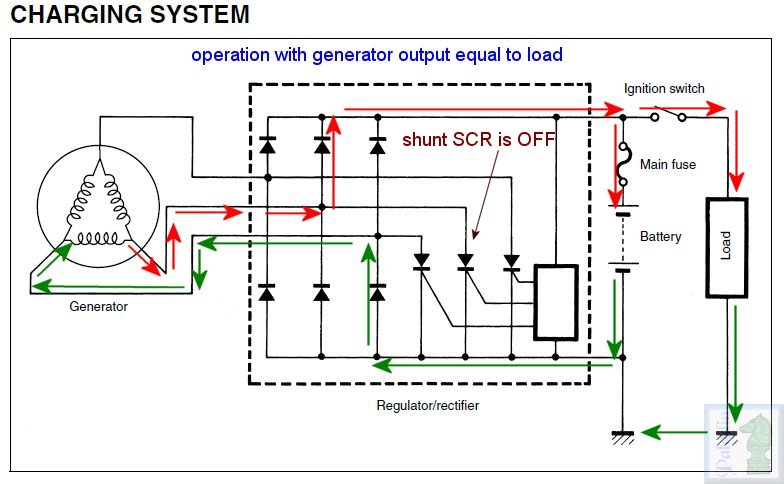 Power flows from the stator winding through a rectifier diode to the battery and load, and returns to the other "end" of that winding through ground and another of the six rectifier diodes. If the load exceeds generator output the battery picks up the slack. When output exceeds load (i.e. most normal operation) the excess capacity is shunted back to the stator winding as shown below: 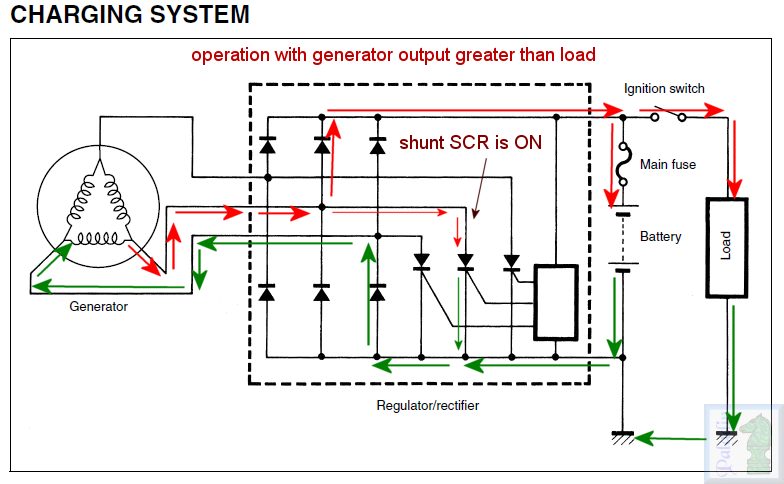 In this case the voltage regulator turns the shunt SCR on (Silicon Controlled Rectifier) as needed to pass the unneeded capacity back to the stator winding. As stated above the heat generated by the R/R is a result of current flow through the internal resistances of the rectifier and shut diodes; more current = more heat whether generator output is being consumed by the load or shunted back to the stator. Most R/R failures I have encountered (I personally have never had one fail on any bike in 55+ years of riding) have been the result of an overloaded system; overloaded because of bad batteries, faulty wiring and often just too many power consuming add-ons. Per the shop manual the generator on the S'Wing has a maximum output of 441 W @ 5,000 rpm; that is not a whole lot of power and it is likely that 150 to 200 W is used just in normal operation. As it is unwise to push a machine to its full capacity 100% of the time that only leaves a couple hundred watts for other stuff... ---------------------------------------------------- * - Note that the HF tester displays internal resistance labeled as MΩ ("megohms"):  This should be mΩ (milliohms). The documentation says milliohms, it is too bad the display does not... |
|
  | |
Cosmic_Jumper
Site Admin

Number of posts : 4415
Age : 81
Location : damn near Philadelphia, PA
Points : 10740
Registration date : 2009-06-12
 |  Subject: Re: Electrical/starting issues Subject: Re: Electrical/starting issues  Mon Jul 18, 2016 12:34 pm Mon Jul 18, 2016 12:34 pm | |
| Woo hoo! Great tutorial, Cliff. Thank you |
|
  | |
exavid
Silver Wing Guru

Number of posts : 2658
Age : 81
Location : Medford, Oregon
Points : 8393
Registration date : 2009-07-17
 |  Subject: Re: Electrical/starting issues Subject: Re: Electrical/starting issues  Mon Jul 18, 2016 1:57 pm Mon Jul 18, 2016 1:57 pm | |
| I don't remember ever seeing a motorcycle with series regulation, at least not since power diodes arrived on the scene. The GL1100 Goldwings had a tendency to over heat the regulator/rectifier module if a headlight burned out on a long run. These shunt systems may be cheap and simple but at a price. All one has to do is touch the regulator/rectifier fins to know that a lot of power is being wasted. |
|
  | |
Cosmic_Jumper
Site Admin

Number of posts : 4415
Age : 81
Location : damn near Philadelphia, PA
Points : 10740
Registration date : 2009-06-12
 |  Subject: Re: Electrical/starting issues Subject: Re: Electrical/starting issues  Mon Jul 18, 2016 3:27 pm Mon Jul 18, 2016 3:27 pm | |
| - exavid wrote:
- I don't remember ever seeing a motorcycle with series regulation, at least not since power diodes arrived on the scene. The GL1100 Goldwings had a tendency to over heat the regulator/rectifier module if a headlight burned out on a long run. These shunt systems may be cheap and simple but at a price. All one has to do is touch the regulator/rectifier fins to know that a lot of power is being wasted.
So is there a work around for this short coming then or, 'it is what it is'? |
|
  | |
cliffyk
Maxi-Scooter Rider


Number of posts : 182
Age : 78
Location : Saint Augustine FL
Points : 3309
Registration date : 2016-05-15
 |  Subject: Re: Electrical/starting issues Subject: Re: Electrical/starting issues  Mon Jul 18, 2016 9:59 pm Mon Jul 18, 2016 9:59 pm | |
| Here is a great thread discussing detailed technical aspects of shunt regulators. It is nearly 5 years old but nothing much has changed. Among other data presented is that a typical SCR based rectifier/regulator in a 500 W system dissipates ("wastes") about 60 watts at most--NOT the entire system capacity as is often put forth.
Yes the R/R does get hot, as 60 watts is not an inconsiderable amount of heat--wrap your hand around a 60 W incandescent lamp if you doubt that.
MOSFET based shunt regulators do run cooler as is discussed in the thread; though MOSFETs are known to be less robust than SCRs. That said if I had an SCR based R/R fail I would likely replace it with a MOSFET unit.
Re: GL1100's burning out regulators when headlamps blew, that may well have been the case. However the last GL1100 came off the line in 1983--things, including semiconductor manufacturing processes, have changed a lot since then... |
|
  | |
Easyrider
Silver Wing Guru

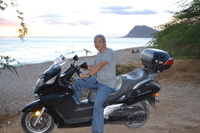
Number of posts : 1013
Age : 74
Location : HI
Points : 4346
Registration date : 2015-12-18
 |  Subject: Re: Electrical/starting issues Subject: Re: Electrical/starting issues  Tue Jul 19, 2016 4:20 pm Tue Jul 19, 2016 4:20 pm | |
| Instead of disconnecting the head lights, do not leave the ignition on without immediately starting your bike. Start it immediately. Your head lights turn off when engaging the starter so there shouldn't be a draw from the head lights when starting your bike. |
|
  | |
exavid
Silver Wing Guru

Number of posts : 2658
Age : 81
Location : Medford, Oregon
Points : 8393
Registration date : 2009-07-17
 |  Subject: Re: Electrical/starting issues Subject: Re: Electrical/starting issues  Wed Jul 20, 2016 10:24 pm Wed Jul 20, 2016 10:24 pm | |
| Cosmic Jumper, With shunt regulators that's pretty much the way it is. They are an effective way to regulate the voltage applied to the bike's circuits as well as converting the AC from the alternator stator to DC. Shunt means parallel, basically dumping excess power from the system. The excess power is converted to heat and radiated from the unit, most of which have fins and are located where a good air flow can cool it. The alternator on these bikes are basically a spinning magnet inside some coils. Output power and voltage is proportional to rpms. The designer sizes the system for a reasonable duty cycle that will keep the battery charged at road speeds. Simple and compact and for 99% of the time with a good battery work just fine. |
|
  | |
cliffyk
Maxi-Scooter Rider


Number of posts : 182
Age : 78
Location : Saint Augustine FL
Points : 3309
Registration date : 2016-05-15
 |  Subject: Re: Electrical/starting issues Subject: Re: Electrical/starting issues  Thu Jul 21, 2016 9:45 pm Thu Jul 21, 2016 9:45 pm | |
| Not all of the "excess power" is dissipated as heat by the R/R; most is shunted back to the stator and "recycled" (again an over-simplification) to the bike's electrical system. Only 50 to 60 watts, a factor of the "on" resistance of the silicon controlled rectifiers, is dissipated as heat by the R/R.
While as stated above this is not an insignificant amount of energy, it remains a fraction of the alternator's full capacity... |
|
  | |
| | Electrical/starting issues |  |
|
